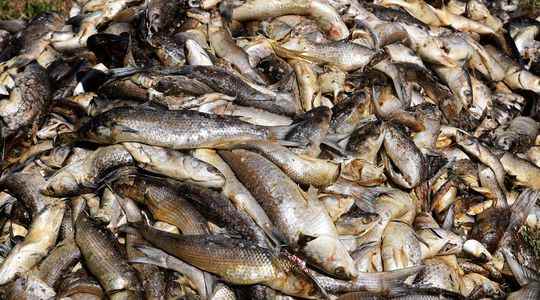Feet in a thin trickle of water, Martin Gerber grumbles: “In places, there is no longer a drop of water. The situation is catastrophic.” For thirty years, this fish farmer has been raising salmon in an attempt to reintroduce them to the Rhine, which became inhospitable in the 1980s due to human activities. From his aquaculture farm on the banks of the river, in Obenheim, in Alsace, the enthusiast sees the fish disappear as the climate emergency increases.
If at the end of August his salmon farm is safe, because it is fed by groundwater, Martin Gerber is worried about the sustainability of wild specimens and aquatic fauna that he sees withering away year after year, while almost all the French departments and a large part of Europe are facing a drought historical. “Global warming is the last straw that is overflowing the already full vase because of catchments, predators, the lack of ecological continuity, pesticides…”, he notes.
Drying up, flow rupture: the summer of 2022 put freshwater fish to the test. With global warming, images of dry rivers and thousands of dead fish are likely to multiply. But if the absence of water challenges, in reality each degree counts for the survival of fish. “Migratory fish like salmon need freshness. To lose these species because of the temperatures is to lose a cultural aspect and millions of years of evolution”, chokes Simon Blanchet, biologist at the CNRS.
Behind the shocking images, a chain reaction
From Ariège, at the Laboratory of Theoretical and Experimental Ecology, the scientist and his team are trying to clarify the impact of global warming. In large tanks, they reconstruct aquatic ecosystems and modify temperatures to observe the effects. If the salmon, an emblematic migratory fish that once came up in number in French rivers, is often cited as an example of the destruction at work, many species are threatened.
Just for migratory fish only passing through France, 6 of the 9 species in the territory are threatened or “near threatened” with extinction, in particular because of global warming, according to the International Union for the Conservation of Nature ( IUCN). In total, one in five freshwater fish species is threatened in the country. Worldwide, one in three freshwater fish is threatened with extinction, according to a joint report by several animal rights associations (WWF, Alliance for Freshwater Life, etc.), published in 2021.
Global warming has drastic consequences for certain species. “Each fish has a temperature tolerance range. Trout is between 4 and 22 degrees. Beyond that, it dies”, explains Simon Blanchet. The heat and the reduced flow drive the oxygen out of the streams. Thus, above a certain threshold, the fish suffocate and die. Especially the bigger ones, which need more oxygen. “We have been alerting for more than ten years. 2022 illustrated our predictions, but in reality 2018, 2019 and 2020 were also particularly deadly”, regrets the researcher.
Large specimens are decimated
Martin Gerber observes the phenomenon in the middle of nature, when he surveys the waterways of Alsace. “To save themselves in the short term, the species tend to migrate upstream, because the springs are on average cooler, but they still have to be able to make their way”, explains the fish farmer. “Dams, locks… There is an obstacle every three kilometers on French rivers, or more than 60,000 in total”, continues Simon Blanchet.
In places, drought is increasingly cutting off rivers, preventing species from advancing. Basins disconnected from each other appear. “We now see them in the center and east of France. It was unthinkable before,” explains the scientist. The spawning grounds become inaccessible; drying out kills eggs laid in the wrong place. “The risk of fish becoming ill also increases, because the temperatures favor the appearance of new pathogens, and these living conditions stress the animal, which weakens its immunity”, adds the researcher.
Global warming also changes the distribution of species according to their sizes. Less demanding of oxygen and often faster to reproduce, the smallest specimens are more resistant to climate change. According to the WWF report, large-bodied species, over 30 kg, saw their population drop by 94%. With big fish being at the top of the food chain, the whole freshwater ecosystem is upset for a few tenths of a degree in places. In Alsace, Martin Gerber lets out a nervous laugh: “It’s dramatic. And the temperatures are only the tree that hides the forest.”
